人教精通版小学英语六年级上册单词句型
六年级上册英语书人教版精通
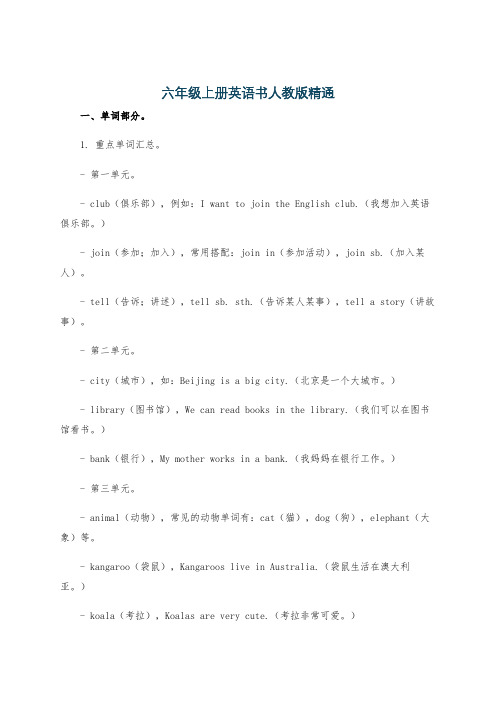
六年级上册英语书人教版精通一、单词部分。
1. 重点单词汇总。
- 第一单元。
- club(俱乐部),例如:I want to join the English club.(我想加入英语俱乐部。
)- join(参加;加入),常用搭配:join in(参加活动),join sb.(加入某人)。
- tell(告诉;讲述),tell sb. sth.(告诉某人某事),tell a story(讲故事)。
- 第二单元。
- city(城市),如:Beijing is a big city.(北京是一个大城市。
)- library(图书馆),We can read books in the library.(我们可以在图书馆看书。
)- bank(银行),My mother works in a bank.(我妈妈在银行工作。
)- 第三单元。
- animal(动物),常见的动物单词有:cat(猫),dog(狗),elephant(大象)等。
- kangaroo(袋鼠),Kangaroos live in Australia.(袋鼠生活在澳大利亚。
)- koala(考拉),Koalas are very cute.(考拉非常可爱。
)- 第四单元。
- hobby(爱好),My hobby is painting.(我的爱好是绘画。
)- reading(阅读),He likes reading books.(他喜欢读书。
)- dancing(跳舞),She is good at dancing.(她擅长跳舞。
)- 第五单元。
- country(国家),China is a great country.(中国是一个伟大的国家。
)- Australia(澳大利亚),There are many unique animals in Australia.(澳大利亚有很多独特的动物。
)- Canada(加拿大),Canada is famous for its maple leaves.(加拿大以枫叶闻名。
人教精通版6年级上下册重点单词和句型默写
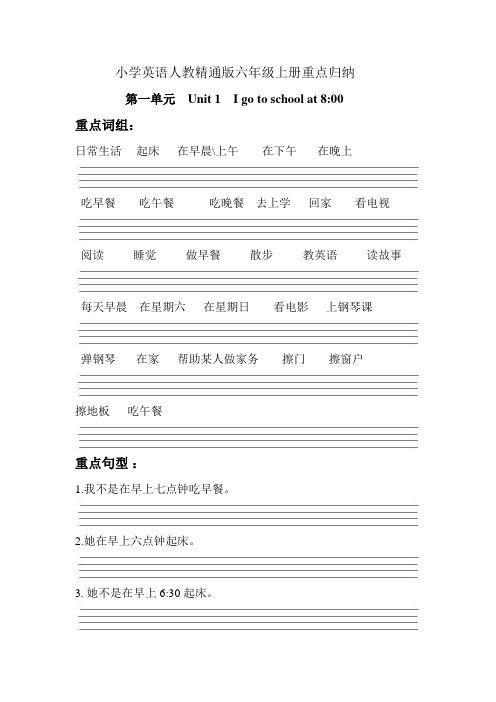
小学英语人教精通版六年级上册重点归纳第一单元Unit 1 I go to school at 8:00重点词组:日常生活起床在早晨\上午在下午在晚上吃早餐吃午餐吃晚餐去上学回家看电视阅读睡觉做早餐散步教英语读故事每天早晨在星期六在星期日看电影上钢琴课弹钢琴在家帮助某人做家务擦门擦窗户擦地板吃午餐重点句型:1.我不是在早上七点钟吃早餐。
2.她在早上六点钟起床。
3. 她不是在早上6:30起床。
4.凯特在周六做什么?5. 她通常弹钢琴。
6.我在7:30吃早饭。
7.我在12:00吃午饭。
8.我在6:00吃晚餐。
9.你在周六干什么?10.我经常去看电影。
第二单元Unit 2 What's your hobby? 重点词组:1. 一辆新的玩具汽车2. 看一看3. 收集玩具汽车4. 收集邮票5.收集地图6. 收集卡片7. 看8. 种花9. 喝中国茶10. 去钓鱼11. 做饭12. 对……感兴趣13. 做布娃娃14. 玩电脑游戏15. 照相16.照顾好17. 谈论18.打篮球19. 寻找20. 在冬天21. 从……到……22. 在夜间23. 在世界上重点句型:1. 你爷爷的爱好是什么?2. 他的爱好是钓鱼。
3. 你对什么感兴趣?4.我对拍照感兴趣。
5. 你的爱好是什么?6. 我的爱好是收集地图。
6. 你爸爸的爱好是什么?7. 他的爱好是种花。
第三单元Unit 3 Would you like to come to my birthday party?重点词组:生日聚会放学后邀请卡邀请朋友参加聚会与朋友庆祝生日向朋友赠送生日贺卡星形蛋糕心形蛋糕水果派\水果馅饼点蜡烛唱生日歌许愿吹蜡烛切蛋糕吃蛋糕一块蛋糕重点句型:1. 你想要什么种类的蛋糕?2.我想要一个心形的蛋糕。
3. 他们怎么庆祝生日的?4. 首先,他们点燃蜡烛,然后……5.你愿意来我的生日晚会吗?6. 当然,我愿意。
7. 再见。
8.我能吃些冰激凌吗?9. 这个生日蛋糕师送给你的。
人教精通版小学英语六年级上册单词表

snowman
n.雪人
19
every
a.每一,每个的
20
morning
n.早晨,上午
21
afternoon
n.下午,午后
22
evening
n.傍晚,晚上
23
see a film
看电影
24
play the piano
弹钢琴
25
clean the window
擦窗户
26
clean the door
擦门
27
clean the floor
擦地板
28
often
ad.经常,常常
29
easy
a.容易的,不费力的
30
difficult
a.难的,艰难的
序号
单词
翻译
1
collect toy cars
搜集玩具汽车
2
collect stamps
搜集邮票
3
collect maps
搜集地图
4
collect picture cards
搜集图片
5
open
a.开着的,开口的;未围上的;开阔的;开放的vt.开,打开;开办
6
hobby
n.业余爱好,嗜好
7
map
n.地图
8
box
n.盒子,箱子
9
colour
n.颜色vt.给…着色,涂色
10
go fishing
(去)钓鱼
11
plant flowers
种花
12
cook meals
做饭
13
dad
n. (口语)爸爸,爹爹
人教精通英语六年级上册句型单词总结
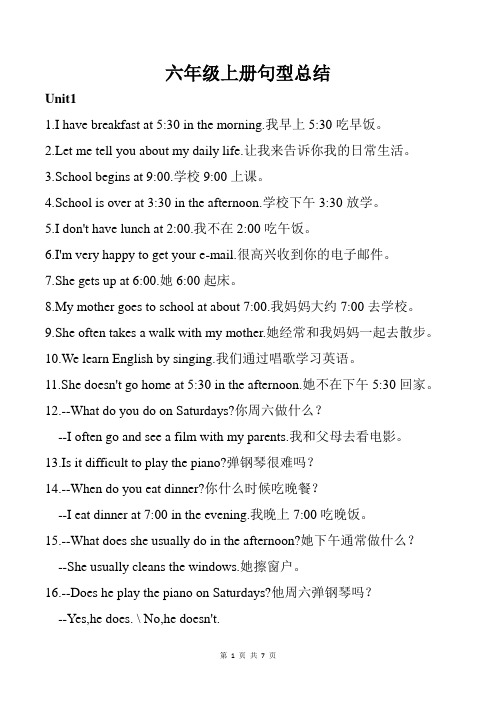
六年级上册句型总结Unit11.I have breakfast at 5:30 in the morning.我早上5:30吃早饭。
2.Let me tell you about my daily life.让我来告诉你我的日常生活。
3.School begins at 9:00.学校9:00上课。
4.School is over at 3:30 in the afternoon.学校下午3:30放学。
5.I don't have lunch at 2:00.我不在2:00吃午饭。
6.I'm very happy to get your e-mail.很高兴收到你的电子邮件。
7.She gets up at 6:00.她6:00起床。
8.My mother goes to school at about 7:00.我妈妈大约7:00去学校。
9.She often takes a walk with my mother.她经常和我妈妈一起去散步。
10.We learn English by singing.我们通过唱歌学习英语。
11.She doesn't go home at 5:30 in the afternoon.她不在下午5:30回家。
12.--What do you do on Saturdays?你周六做什么?--I often go and see a film with my parents.我和父母去看电影。
13.Is it difficult to play the piano?弹钢琴很难吗?14.--When do you eat dinner?你什么时候吃晚餐?--I eat dinner at 7:00 in the evening.我晚上7:00吃晚饭。
15.--What does she usually do in the afternoon?她下午通常做什么?--She usually cleans the windows.她擦窗户。
人教精通版小学英语六年级上册单元知识点总结(全册)(完美版)

Unit1Igotoschoolat8:00.一、核心词汇1.描述日常活动的词汇cleanthewindow擦窗户cleanthedoor擦门cleanthefloor擦地板2.描述三餐的词汇breakfast早餐lunch午餐dinner晚餐3.描述时间的词汇morning早晨afternoon下午evening晚上; 傍晚4.频率副词often时常; 常常5.其他walk走; 步行every每一个easy容易difficult困难二、拓展词组描述日常活动的词组getup起床havebreakfast吃早餐gotoschool去上学havelunch吃午饭gohome回家havedinner吃晚饭watchTV看电视gotobed睡觉cookbreakfast做早餐teachEnglish教英语takeawalk散步readstories读故事seeafilm看电影playthepiano弹钢琴三、核心句型1.Igetupat7:30inthemorning. 我早晨七点半起床。
解读:此句是一个陈述句, 用来描述我在某一时刻所做的事情。
举一反三:Igotoschoolat8:00inthemorning. 我早晨八点去上学。
她不在上午六点半起床。
2.Shedoesn’tgetupat6:30inthemorning.解读: 此句是一个否定句, 用来描述某人在某一时刻没有做的事情。
举一反三:Shedoesn’tgetupat6:40.她不在六点四十分起床。
3.— WhatdoyoudoonSaturdays? 你星期六做什么?— Ioftengoandseeafilmwithmyparents. 我经常和我的父母一起去看电影。
解读:这是用来询问对方某天做什么及其回答的句子。
举一反三:— Whatdoyoudoontheweekend? 你周末做什么?— Ioftendohomework. 我经常做作业。
人教精通版小学英语六年级上册默写表
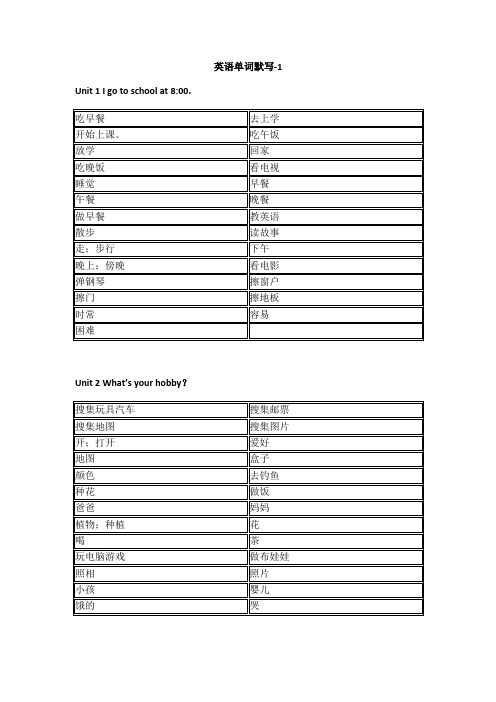
walk
afternoon
evening
see a film
play the piano
clean the window
clean the door
clean the floor
often
easy
difficult
Unit 2 What’s your hobby?
collect toy cars
rain
pick apples
cut rice
make a snowman
sweep the snow
autumn
yellow
brown
white
winter
snowman
collect stamps
collect maps
collect picture cards
open
hobby
map
box
colour
go fishing
plant flowers
cook meals
dad
mum
plant
flower
drink
tea
play computer games
make dolls
have breakfast
go to school
School begins
have lunch
School is over
go home
have dinner
watch TV
go to bed
breakfast
lunch
dinner
cook breakfast
teach English
take a walk
人教精通版本小学英语小学六年级的上册的单词句型
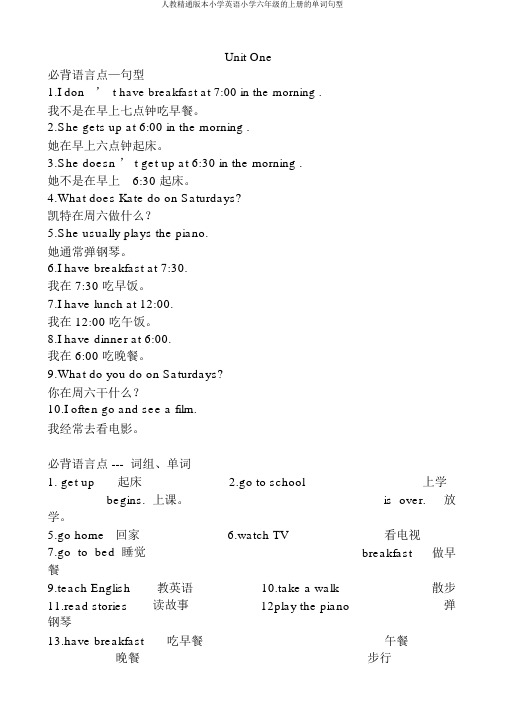
Unit One必背语言点—句型1.I don’ t have breakfast at 7:00 in the morning .我不是在早上七点钟吃早餐。
2.She gets up at 6:00 in the morning .她在早上六点钟起床。
3.She doesn ’ t get up at 6:30 in the morning .她不是在早上6:30 起床。
4.What does Kate do on Saturdays?凯特在周六做什么?5.She usually plays the piano.她通常弹钢琴。
6.I have breakfast at 7:30.我在 7:30 吃早饭。
7.I have lunch at 12:00.我在 12:00 吃午饭。
8.I have dinner at 6:00.我在 6:00 吃晚餐。
9.What do you do on Saturdays?你在周六干什么?10.I often go and see a film.我经常去看电影。
必背语言点 --- 词组、单词1. get up起床2.go to school上学begins. 上课。
is over.放学。
5.go home回家6.watch TV看电视7.go to bed 睡觉breakfast做早餐9.teach English教英语10.take a walk散步11.read stories读故事12play the piano弹钢琴13.have breakfast吃早餐午餐晚餐步行每一早上,上午19.afternoon 下午晚上经常22.see a film看电影23.clean the window/door/floor擦窗户 / 门 / 地板容易的困难的Unit Two必背语言点—句型1. What’ s your grandpa’ s hobby?你爷爷的爱好是什么?2.His hobby is fishing .他的爱好是钓鱼。
完整版)小学英语人教精通版六年级上册重点归纳
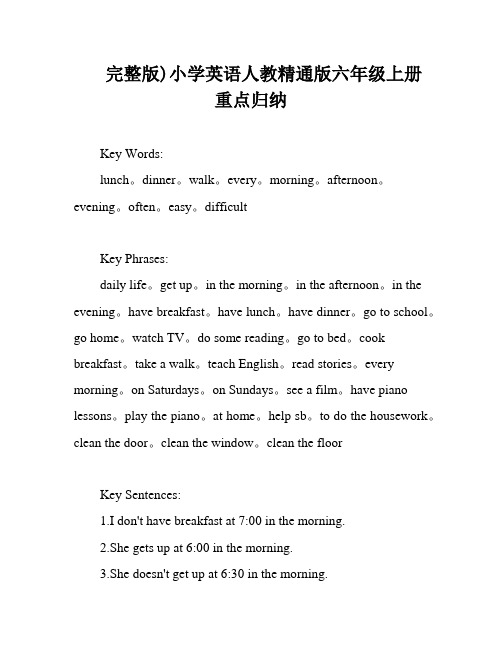
完整版)小学英语人教精通版六年级上册重点归纳Key Words:lunch。
dinner。
walk。
every。
morning。
afternoon。
evening。
often。
easy。
difficultKey Phrases:daily life。
get up。
in the morning。
in the afternoon。
in the evening。
have breakfast。
have lunch。
have dinner。
go to school。
go home。
watch TV。
do some reading。
go to bed。
cook breakfast。
take a walk。
teach English。
read stories。
every morning。
on Saturdays。
on Sundays。
see a film。
have piano lessons。
play the piano。
at home。
help sb。
to do the housework。
clean the door。
clean the window。
clean the floorKey Sentences:1.I don't have breakfast at 7:00 in the morning.2.She gets up at 6:00 in the morning.3.She doesn't get up at 6:30 in the morning.4.What does Kate do on Saturdays?5.She usually plays the piano.6.I have breakfast at 7:30.In daily life。
we have three meals a day: lunch。
dinner。
and breakfast。
We often walk to school。
小学英语人教精通版六年级上册重点归纳

小学英语人教精通版六年级上册重点归纳第一单元Unit 1 重点单词:lunch 午餐every 每一个evening 晚上difficult困难重点词组:1. daily life 日常生活3. in the morning 在早晨上午5. in the evening 在晚上7. have lunch 吃午餐walk 走;步行afternoon 下午easy容易2. get up 起床4. in the afternoon 在下午6. have breakfast 吃早餐8. have dinner 吃晚餐10. go home 回家12. do some reading 阅读14. cook breakfast 做早餐16. teach English 教英语18. every morning 每天早晨20. on Sundays 在星期日22. have Pia no IeSS OnS 上钢琴课24. at home 在家25. help sb. to do the housework帮助某人做家务26. clea n the door扌察门27. clean the window 擦窗户I go to school at 8:00dinner 晚餐morning 早上often时常;常常9. go to school 去上学11. watch TV 看电视13. go to bed 睡觉15. take a walk 散步17. read stories 读故事19. on Saturdays 在星期六21. see a film 看电影23. play the piano 弹钢琴28. clean the floor 擦地板重点句型:1.I don'h t ave breakfast at 7:00 in the morning .我不是在早上七点钟吃早餐。
2.She gets up at 6:00 in the morning 她. 在早上六点钟起床。
六年级上册英语单词精通版
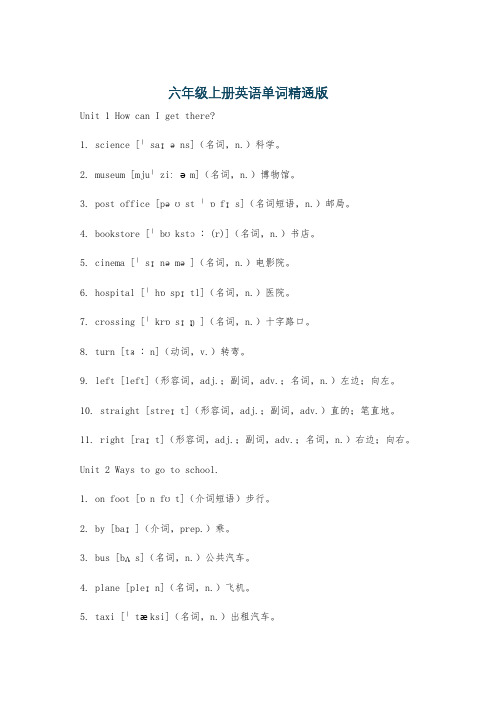
六年级上册英语单词精通版Unit 1 How can I get there?1. science [ˈsaɪəns](名词,n.)科学。
2. museum [mjuˈziːəm](名词,n.)博物馆。
3. post office [pəʊst ˈɒfɪs](名词短语,n.)邮局。
4. bookstore [ˈbʊkstɔː(r)](名词,n.)书店。
5. cinema [ˈsɪnəmə](名词,n.)电影院。
6. hospital [ˈhɒspɪtl](名词,n.)医院。
7. crossing [ˈkrɒsɪŋ](名词,n.)十字路口。
8. turn [tɜːn](动词,v.)转弯。
9. left [left](形容词,adj.;副词,adv.;名词,n.)左边;向左。
10. straight [streɪt](形容词,adj.;副词,adv.)直的;笔直地。
11. right [raɪt](形容词,adj.;副词,adv.;名词,n.)右边;向右。
Unit 2 Ways to go to school.1. on foot [ɒn fʊt](介词短语)步行。
2. by [baɪ](介词,prep.)乘。
3. bus [bʌs](名词,n.)公共汽车。
4. plane [pleɪn](名词,n.)飞机。
5. taxi [ˈtæksi](名词,n.)出租汽车。
6. ship [ʃɪp](名词,n.)船。
7. subway [ˈsʌbweɪ](名词,n.)地铁。
8. train [treɪn](名词,n.)火车。
9. slow [sləʊ](形容词,adj.)慢的。
10. down [daʊn](介词,prep.;副词,adv.)减少;降低;向下。
11. slow down [sləʊ daʊn](动词短语)慢下来。
12. stop [stɒp](动词,v.;名词,n.)停止;车站。
Unit 3 My weekend plan.1. visit [ˈvɪzɪt](动词,v.)拜访;参观。
六年级上英语精通版
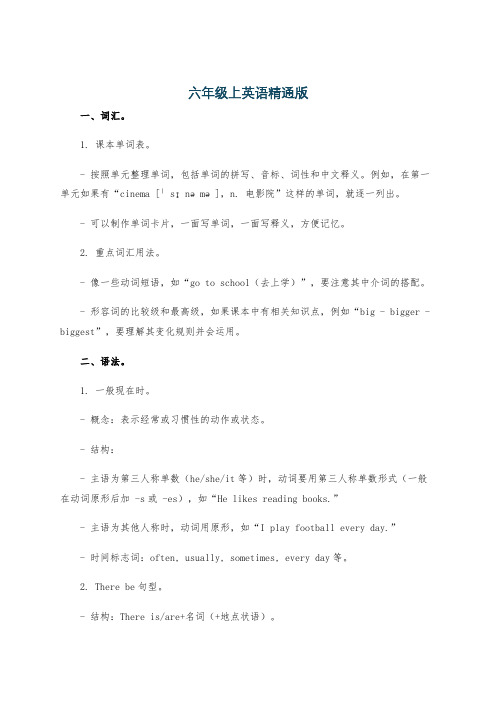
六年级上英语精通版一、词汇。
1. 课本单词表。
- 按照单元整理单词,包括单词的拼写、音标、词性和中文释义。
例如,在第一单元如果有“cinema [ˈsɪnəmə],n. 电影院”这样的单词,就逐一列出。
- 可以制作单词卡片,一面写单词,一面写释义,方便记忆。
2. 重点词汇用法。
- 像一些动词短语,如“go to school(去上学)”,要注意其中介词的搭配。
- 形容词的比较级和最高级,如果课本中有相关知识点,例如“big - bigger - biggest”,要理解其变化规则并会运用。
二、语法。
1. 一般现在时。
- 概念:表示经常或习惯性的动作或状态。
- 结构:- 主语为第三人称单数(he/she/it等)时,动词要用第三人称单数形式(一般在动词原形后加 -s或 -es),如“He likes reading books.”- 主语为其他人称时,动词用原形,如“I play football every day.”- 时间标志词:often, usually, sometimes, every day等。
2. There be句型。
- 结构:There is/are+名词(+地点状语)。
- 区别:is用于单数名词或不可数名词,are用于复数名词。
例如“There is a book on the desk.”和“There are some books on the desk.”- 就近原则:如果be动词后面有多个名词,be动词的形式要根据离它最近的名词的单复数来确定,如“There is a pen and two pencils in the box.”三、句型。
1. 询问职业。
- What does your father do? He is a doctor.- 要学会替换不同的职业单词,如teacher, worker, driver等。
2. 询问爱好。
- What are your hobbies? I like singing and dancing.- 注意hobby(单数)和hobbies(复数)的用法区别。
小学英语人教精通版六年级上册重点归纳
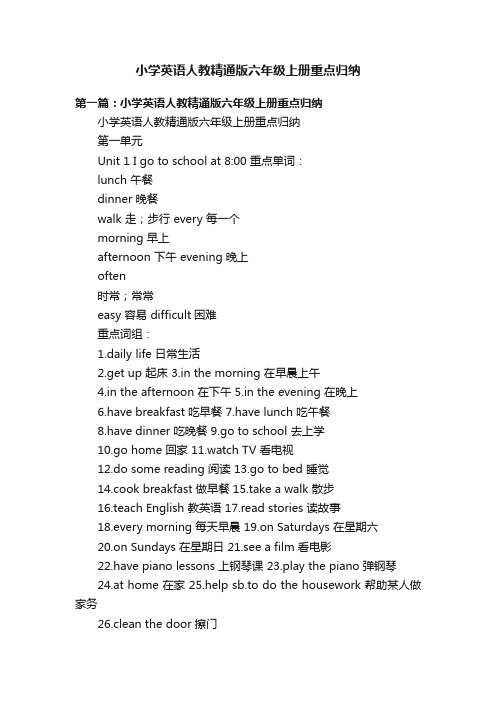
小学英语人教精通版六年级上册重点归纳第一篇:小学英语人教精通版六年级上册重点归纳小学英语人教精通版六年级上册重点归纳第一单元Unit 1 I go to school at 8:00 重点单词:lunch 午餐dinner 晚餐walk 走;步行 every 每一个morning 早上afternoon 下午 evening 晚上often时常;常常easy 容易 difficult困难重点词组:1.daily life 日常生活2.get up 起床3.in the morning 在早晨上午4.in the afternoon 在下午5.in the evening 在晚上6.have breakfast 吃早餐7.have lunch 吃午餐8.have dinner 吃晚餐 9.go to school 去上学10.go home 回家 11.watch TV 看电视12.do some reading 阅读 13.go to bed 睡觉14.cook breakfast 做早餐 15.take a walk 散步16.teach English 教英语 17.read stories 读故事18.every morning 每天早晨 19.on Saturdays 在星期六20.on Sundays 在星期日 21.see a film 看电影22.have piano lessons 上钢琴课 23.play the piano 弹钢琴24.at home 在家 25.help sb.to do the housework 帮助某人做家务26.clean the door 擦门27.clean the window 擦窗户 28.clean the floor 擦地板重点句型:1.I don’t have breakfast at 7:00 in the morning.我不是在早上七点钟吃早餐。
小学英语人教精通版六年级上册重点归纳

小学英语人教精通版六年级上册重点归纳第一单元Unit 1 I go to school at 8:00重点词组:1. daily life 日常生活2. get up 起床3. in the morning 在早晨\上午4. in the afternoon 在下午5. in the evening 在晚上6. have breakfast 吃早餐7. have lunch 吃午餐8. have dinner 吃晚餐9. go to school 去上学10. go home 回家11. watch TV 看电视12. do some reading 阅读13. go to bed 睡觉14. cook breakfast 做早餐15. take a walk 散步16. teach English 教英语17. read stories 读故事18. every morning 每天早晨19. on Saturdays 在星期六20. on Sundays 在星期日21. see a film 看电影22. have piano lessons 上钢琴课23. play the piano 弹钢琴24. at home 在家25. help sb. to do the housework 帮助某人做家务26. clean the door 擦门27. clean the window 擦窗户28. clean the floor 擦地板29. eat lunch 吃午餐重点句型:1.I don’t have breakfast at 7:00 in the morning . 我不是在早上七点钟吃早餐。
2.She gets up at 6:00 in the morning . 她在早上六点钟起床。
3.She doesn’t get up at 6:30 in the morning . 她不是在早上6:30起床。
最新人教精通版小学英语六年级上册单元知识点总结(全册)

Unit1Igotoschoolat8:00.一、核心词汇1.描述日常活动的词汇cleanthewindow擦窗户cleanthedoor擦门cleanthefloor擦地板2.描述三餐的词汇breakfast早餐lunch午餐dinner晚餐3.描述时间的词汇morning早晨afternoon下午evening晚上; 傍晚4.频率副词often时常; 常常5.其他walk走; 步行every每一个easy容易difficult困难二、拓展词组描述日常活动的词组getup起床havebreakfast吃早餐gotoschool去上学havelunch吃午饭gohome回家havedinner吃晚饭watchTV看电视gotobed睡觉cookbreakfast做早餐teachEnglish教英语takeawalk散步readstories读故事seeafilm看电影playthepiano弹钢琴三、核心句型1.Igetupat7:30inthemorning. 我早晨七点半起床。
解读:此句是一个陈述句, 用来描述我在某一时刻所做的事情。
举一反三:Igotoschoolat8:00inthemorning. 我早晨八点去上学。
2.Shedoesn’tgetupat6:30inthemorning.她不在上午六点半起床。
解读: 此句是一个否定句, 用来描述某人在某一时刻没有做的事情。
举一反三:Shedoesn’tgetupat6:40.她不在六点四十分起床。
3.— WhatdoyoudoonSaturdays? 你星期六做什么?— Ioftengoandseeafilmwithmyparents. 我经常和我的父母一起去看电影。
解读:这是用来询问对方某天做什么及其回答的句子。
举一反三:— Whatdoyoudoontheweekend? 你周末做什么?— Ioftendohomework. 我经常做作业。
六年级上册人教精通版
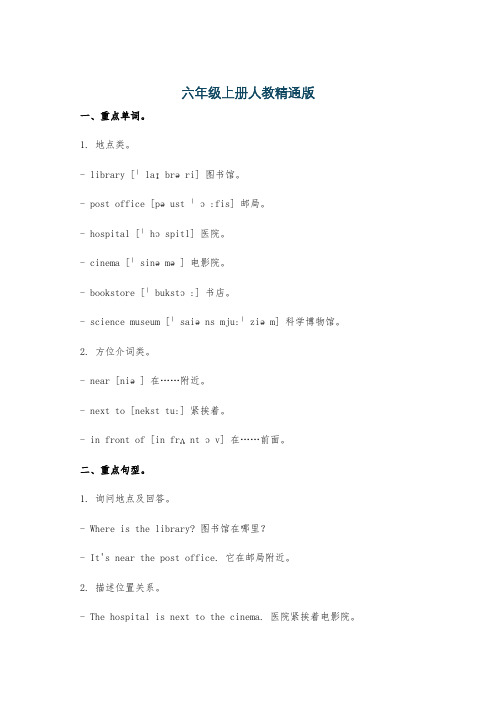
六年级上册人教精通版一、重点单词。
1. 地点类。
- library [ˈlaɪbrəri] 图书馆。
- post office [pəust ˈɔ:fis] 邮局。
- hospital [ˈhɔspitl] 医院。
- cinema [ˈsinəmə] 电影院。
- bookstore [ˈbukstɔ:] 书店。
- science museum [ˈsaiəns mju:ˈziəm] 科学博物馆。
2. 方位介词类。
- near [niə] 在……附近。
- next to [nekst tu:] 紧挨着。
- in front of [in frʌnt ɔv] 在……前面。
二、重点句型。
1. 询问地点及回答。
- Where is the library? 图书馆在哪里?- It's near the post office. 它在邮局附近。
2. 描述位置关系。
- The hospital is next to the cinema. 医院紧挨着电影院。
- There is a bookstore in front of the science museum. 在科学博物馆前面有一个书店。
三、语法点。
1. there be句型。
- 概念:表示“某地有某物”。
- 结构:There is + 单数可数名词/不可数名词+地点状语.- 例如:There is a park in my neighborhood.- There are+复数可数名词+地点状语.- 例如:There are some trees in the park.- 就近原则:当有多个并列主语时,be动词的形式取决于离它最近的主语的单复数形式。
- 例如:There is a book and two pens on the desk.(离be动词最近的是a book,为单数,所以用is)- There are two pens and a book on the desk.(离be动词最近的是two pens,为复数,所以用are)2. 方位介词的用法。
人教版六年级英语上
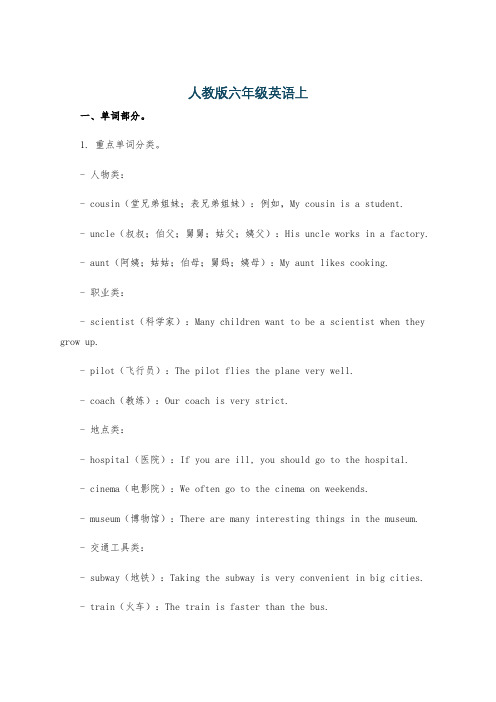
人教版六年级英语上一、单词部分。
1. 重点单词分类。
- 人物类:- cousin(堂兄弟姐妹;表兄弟姐妹):例如,My cousin is a student.- uncle(叔叔;伯父;舅舅;姑父;姨父):His uncle works in a factory.- aunt(阿姨;姑姑;伯母;舅妈;姨母):My aunt likes cooking.- 职业类:- scientist(科学家):Many children want to be a scientist when they grow up.- pilot(飞行员):The pilot flies the plane very well.- coach(教练):Our coach is very strict.- 地点类:- hospital(医院):If you are ill, you should go to the hospital.- cinema(电影院):We often go to the cinema on weekends.- museum(博物馆):There are many interesting things in the museum.- 交通工具类:- subway(地铁):Taking the subway is very convenient in big cities.- train(火车):The train is faster than the bus.- plane(飞机):We can go to other countries by plane.2. 单词记忆方法。
- 联想法:- 对于“hospital”这个单词,可以联想医院里有很多病人(patients),医生(doctors)和护士(nurses)在忙碌地工作,这样就容易记住这个单词的含义。
- 词根词缀法:- “scientist”这个单词,“science”表示“科学”,加上“ -ist”这个表示“人”的后缀,就变成了“科学家”。
小学英语人教精通版六年级上册第三单元
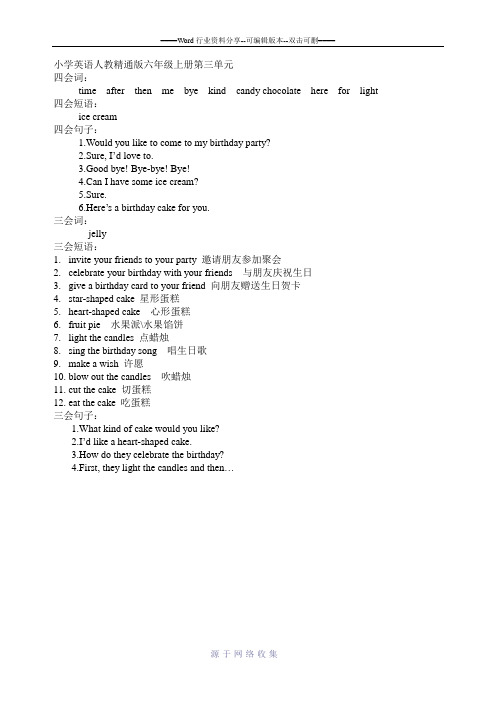
====Word行业资料分享--可编辑版本--双击可删====小学英语人教精通版六年级上册第三单元四会词:time after then me bye kind candy chocolate here for light 四会短语:ice cream四会句子:1.Would you like to come to my birthday party?2.Sure, I’d love to.3.Good bye! Bye-bye! Bye!4.Can I have some ice cream?5.Sure.6.Here’s a birthday cake for you.三会词:jelly三会短语:1.invite your friends to your party 邀请朋友参加聚会2.celebrate your birthday with your friends 与朋友庆祝生日3.give a birthday card to your friend 向朋友赠送生日贺卡4.star-shaped cake 星形蛋糕5.heart-shaped cake 心形蛋糕6.fruit pie 水果派\水果馅饼7.light the candles 点蜡烛8.sing the birthday song 唱生日歌9.make a wish 许愿10.blow out the candles 吹蜡烛11.cut the cake 切蛋糕12.eat the cake 吃蛋糕三会句子:1.What kind of cake would you like?2.I’d like a heart-shaped cake.3.How do they celebrate the birthday?4.First, they light the candles and then…源-于-网-络-收-集。
- 1、下载文档前请自行甄别文档内容的完整性,平台不提供额外的编辑、内容补充、找答案等附加服务。
- 2、"仅部分预览"的文档,不可在线预览部分如存在完整性等问题,可反馈申请退款(可完整预览的文档不适用该条件!)。
- 3、如文档侵犯您的权益,请联系客服反馈,我们会尽快为您处理(人工客服工作时间:9:00-18:30)。
Unit One必背语言点—句型1.I don’t have breakfast at 7:00 in the morning . 我不是在早上七点钟吃早餐。
2.She gets up at 6:00 in the morning .她在早上六点钟起床。
3.She doesn’t get up at 6:30 in the morning .她不是在早上6:30起床。
4.What does Kate do on Saturdays?凯特在周六做什么?5.She usually plays the piano.她通常弹钢琴。
6.I have breakfast at 7:30.我在7:30吃早饭。
7.I have lunch at 12:00.我在12:00吃午饭。
8.I have dinner at 6:00.我在6:00吃晚餐。
9.What do you do on Saturdays?你在周六干什么?10.I often go and see a film.我经常去看电影。
必背语言点---词组、单词1.get up 起床2.go to school 上学3.School begins.上课。
4.School is over. 放学。
5.go home 回家6.watch TV看电视7.go to bed 睡觉8.cook breakfast 做早餐9.teach English 教英语10.take a walk 散步11.read stories读故事12play the piano 弹钢琴13.have breakfast吃早餐14.lunch 午餐15.dinner 晚餐16.walk 步行17.every 每一18.morning 早上,上午19.afternoon 下午20.evening晚上21.often 经常22.see a film 看电影23.clean the window/door/floor 擦窗户/门/地板24.easy 容易的25.difficult 困难的Unit Two 必背语言点—句型1.What’s your grandpa’s hobby?你爷爷的爱好是什么?2.His hobby is fishing .他的爱好是钓鱼。
3.What are you interested in?你对什么感兴趣?4.I’m interested in taking photos.我对拍照感兴趣。
5.What’s your hobby?你的爱好是什么?6. My hobby is collecting maps.我的爱好是收集地图。
6.What’s your dad’s hobby?你爸爸的爱好是什么?7.His hobby is planting flowers .他的爱好是种花。
必背语言点---词组、单词1.collect toy cars 收集玩具小汽车2.collect picture cards 收集图片3.collect stamps 收集邮票4.go fishing 去钓鱼5.cook meals 做饭6.play computer games玩电脑游戏7.make dolls 制作娃娃8.open 打开9.hobby 爱好10.collect 收集11.map 地图11.box 盒子12.colour 颜色13.dad 爸爸14.mum 妈妈15.plant 种植16.flower 花17.drink 喝18.tea 茶19.take 带走20.photo 照片21.kid小孩22.baby 婴儿23.hungry 饥饿24.cry 哭Unit Three必背语言点1.What kind of cake would you like? 你想要什么种类的蛋糕?2.I’d like a heart-shaped cake. 我想要一个心形的蛋糕。
3.How do they celebrate the birthday? 他们怎么庆祝生日的?4.First, they light the candles and then 首先,他们点燃蜡烛,然后……5.Would you like to come to my birthday party? 你愿意来我的生日晚会吗?6.Sure. I’d love to . 当然,我愿意。
7.Good bye!/Bye-bye!/Bye! 再见。
8.Can I have some ice cream ? 我能吃些冰激凌吗?9.Here’s a birthday cake for you . 这个生日蛋糕师送给你的。
10.i nvite your friends to your party 邀请你的朋友到你的晚会11.c elebrate your birthday with your friends 和你的朋友一起庆祝你的生日12.g ive a birthday card to your friend 把这个生日卡片给你朋友13.s tar-shaped cake 星星形状的蛋糕14.h eart-shaped cake 心形的蛋糕15.f ruit pie 水果派16.l ight the candles 点燃蜡烛17.s ing the birthday song 唱生日歌18.m ake a wish 许愿19.b low out the candles 吹灭蜡烛20.c ut the cake 切蛋糕21.e at the cake 吃蛋糕22.t ime 时间23.after 在……之后24.then 然后25.me 我(宾格) 26.kind 种类27.ice cream 冰激凌28.candy 糖果29.here 这儿30.for 为了31.light 点燃,轻的Unit Four 必背语言点1.January is the first month of the year.一月份是一年中的第一个月。
2.February is the second month of the year. 二月份是一年中的第二个月。
3.March is the third month of the year .三月份是一年中的第三个月。
4.April is the fourth month of the year.四月份是一年中的第四个月。
5.May is the fifth month of the year .五月份是一年中的第五个月。
6.June is the sixth month of the year .六月份是一年中的第六个月。
7.New Year’s Day 新年8.Spring Festival 春节9.Tree Planting Day 植树节10.Easter 复活节bour Day 劳动节12.Januray 一月13.February 二月14.back 回来15.their 他们的16.March 三月17.April 四月18.tree 树19.grass 草20.stop 停止21.egg 鸡蛋22.May 五月23.June 六月24.Mother’s Day 母亲节25.Father’s Day 父亲节26.Children’s Day 儿童节Unit Five必背语言点1.July is the seventh month of the year.七月是一年中的第七个月。
2.August is the eighth month of the year.八月是一年中的第八个月。
3.September is the ninth month of the year.九月份是一年中的第九个月。
4.October is the tenth month of the year.十月份是一年中的第十个月。
5.November is the eleventh month of the year. 十一月份是一年中的第十一个月。
6.December is the twelfth month of the year. 十二月份是一年中的第十二个月。
7.the Party’s birthday 党的生日8.Army Day 建军节9.National Day 国庆节10.T hanksgiving 感恩节11.C hristmas 圣诞节12.J uly 七月13.A ugust 八月14.m onth 月份15.y ear 年16.S eptember 九月17.O ctober 十月18.T eachers’ Day 教师节19.N ovember 十一月份20.D ecember 十二月份21.D ecember is the last . 十二月份是最后一个。
22.m onth of the year 一年中的月份传播优秀Word版文档,希望对您有帮助,可双击去除!Unit Six必背语言点1.What’s spring like?春天是什么样的?2.What do people do in spring?人们在春天做什么?3.Trees have new green leaves .树木长着新的绿叶。
4.There are a lot of flowers on the peach trees.在桃树上有许多花。
5.Birds sing to welcome the spring .鸟儿唱着歌迎接春天的到来。
6.What do students do on summer holidays?学生们在暑假做什么?7.What do people do in autumn and winter?人们在秋天和冬天做什么?8.Spring is the first season .春天是第一个季节。
---精心整理,希望对您有所帮助。
